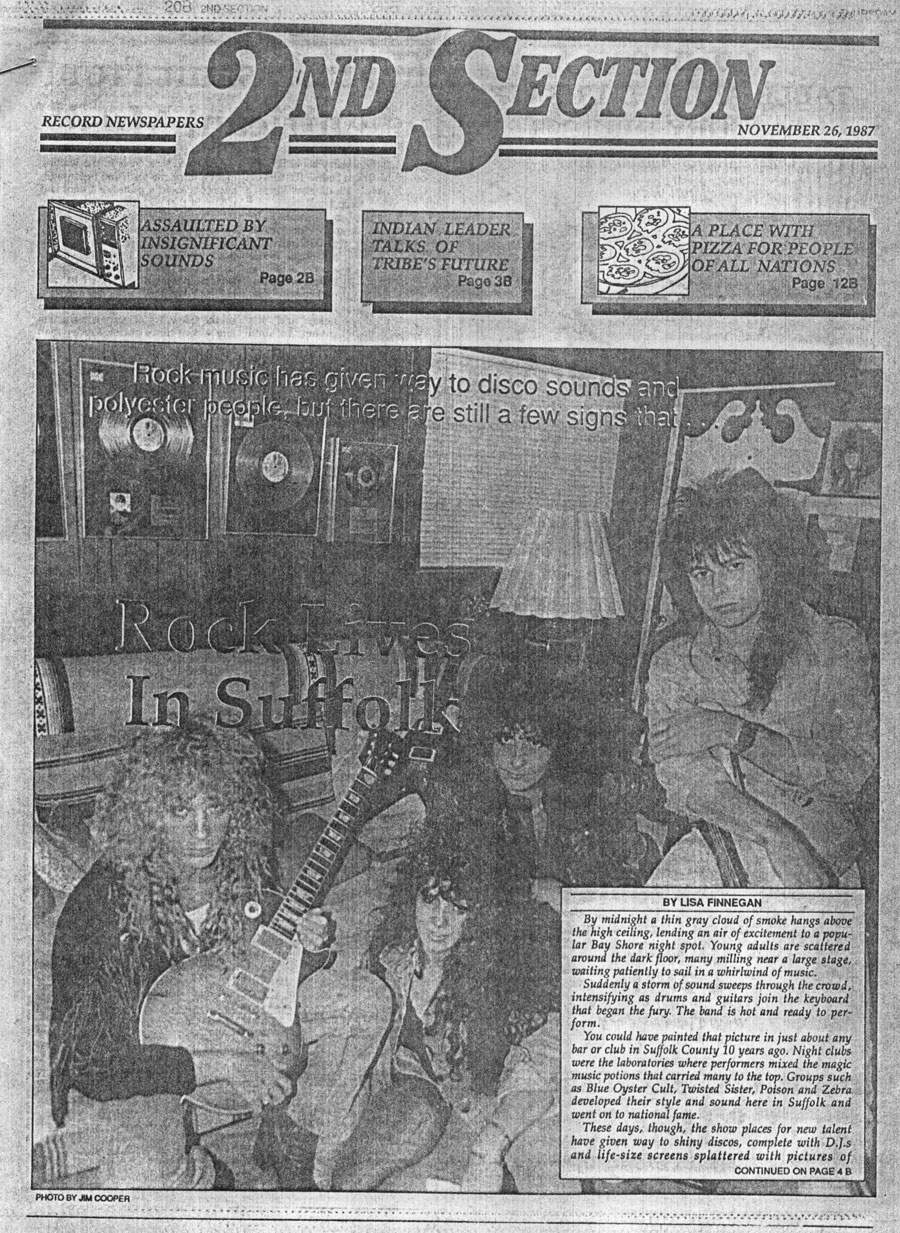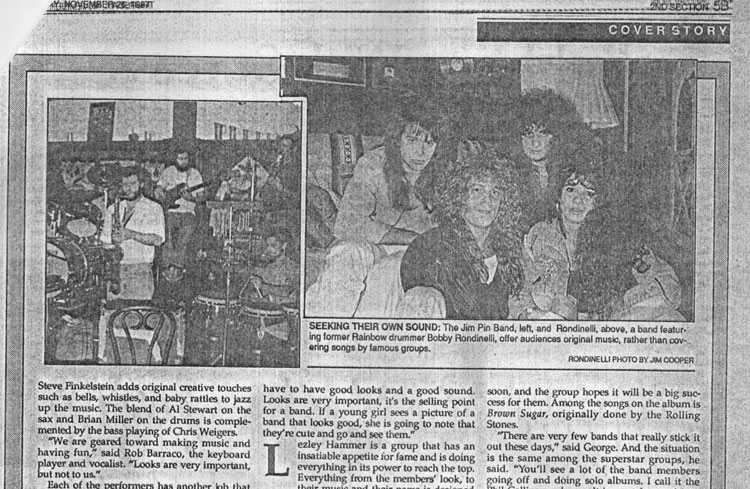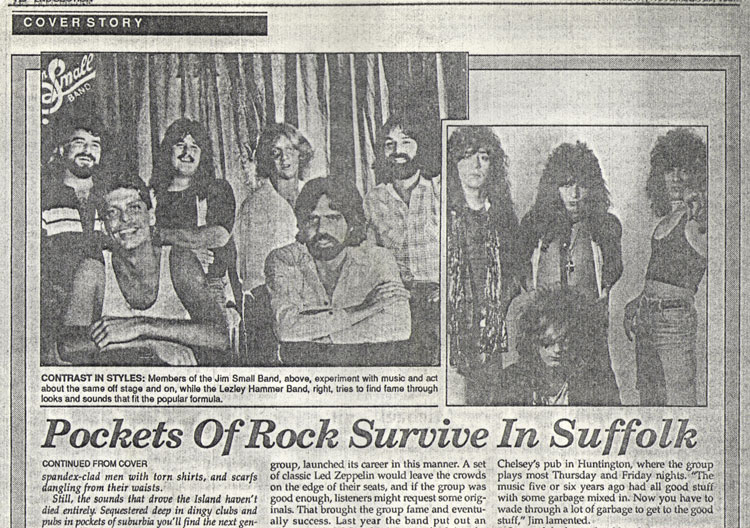Rock music has given way to disco sounds and
polyester people, but there are still a few sign that …
Rock Lives in Suffolk
By Lisa Finnegan
By midnight a thin gray cloud of smoke hangs above the thigh ceiling, lending an air of excitement to a popular Bay Shore night spot. Young adult are scattered around the dark floor, many milling near a large stage, waiting patiently to sail in a whirlwind of music.
Suddenly a storm of sound sweeps through the crowd, intensifying as drums and guitars join the keyboard that began the fury. The band is hot and ready to perform.
You could have painted that picture in just about any bar or club in Suffolk County 10 years ago. Night clubs were the laboratories where performers mixed the magic music potions that carried many to the top. Groupssuch as Blue Oyster Cult, Twisted Sister, Poison and Zebra developed their style and sound here in Suffolk and went on to national fame.
These days, though, the show places for the new talent have given way to shiny discos, complete with D.J.s and life-size screens splattered with pictures of spandex-clad men with torn shirts, and scarfs dangling from their waist.
Still, the sounds that drove the Island haven't died entirely, Sequestered deep in the dingy clubs and pubs in pockets of suburbia you'll find the next generation of rock stars - Suffolk's latest, hottest rock bands.

the images accompanying this article were
scanned from a really bad photocopy.
Rondinelli, a band that blends innovative original music and the long-haired wild look that teenagers adore, has not been playing together for that long, but its sound shines, perhaps because three of the four members come from the same family of musicians.
Bobby Rondinelli, the drummer and group spokesman, is the oldest of the clan. As a musician he has seen the most success. Four gold albums, from his years with the soft rock group Rainbow, hang in the family living room in Port Jefferson Station.
"Working with your family helps, I mean, we have played together all our lives. The direction of the band is established and that's great; the hardest thing for a band to do is set a direction. [Being related] also helps the group stay together. If my brother said the things he says to me and wasn't my brother, this group would have ended the second day," Bobby said as his brother Teddy smiled.
"You can really speak your mind," said Teddy, the lead guitarist. "We really jell."
Bassist Rob DeMartino, the only non-family member of the band, agreed that the family atmosphere helps mold the band.
"Hey, at least I always know where they are, and they never miss a practice session," he said.
Rondinelli only plays originals, with the music mostly written by Teddy with input from Bobby. Lyrics come from the musician's 58-year-old father, writer Bob Rondinelli Sr.
The group exemplifies the major change in rock sounds in Suffolk these days. Five or six years ago, a band would draw a crowd by playing popular songs interspersed with their own material. In this way, the audience would associate a band with the music it played and be drawn to the various night spots.
Zebra, a popular native Long Island rock group, launched its career in this manner. A set of classic Led Zeppelin would leave the crowds on the edge of their seats, and if the group was good enough, listeners might request some originals. That brought the group fame and eventually success. Last year the band put our an album entitles 3.5 and it is currently doing the local club circuit.
"The club scene has really changed," said Bobby Rondinelli. "About eight to 10 years ago, my band would have to tell the club owners that an original song we were playing was just released by Foreigner and hasn't come out in an album yet. They just didn't want to hear any of your new stuff."
Bobby and Teddy say that they are lucky enough to be able to completely devote themselves to music because they have the support of their parents and live at home along with sister Dorothy, the group's keyboardist. Rob DeMartino also live at home with his parents and says he too has a good set-up.
"My mom was in the USO and sang during the war so she is really supportive," he said proudly.
But not many musicians are able to live on their music alone. There are so few clubs booking live acts that most performers have to work odd jobs during the day to pay the rent.
"Things have changed over the past few years. People just don't go out to see live bands play. A lot of musicians are hooking up with wedding bands to make some cash," says Jay Nova, booking agent and promotional director for L'Amour Far East, a night club in Commack.
Carpentry, maintenance work and music lessons are what keep the members of the Jim Small Band solvent. A down-home kind of rock band, in the mold of Creedence Clearwater Revival and Crosby, Stills, Nash and Young, the group prides itself on its sincerity and dedication to playing "good, clean music."
"We play because we love to play. There is nothing else that I really want to do. But it is a tough business and everybody is out for themselves. You have to be careful not to compromise what you really are aiming to do just for a record deal." Jim Small said, in between sets at Chelsey's [sic] pub in Huntington, where the group plays most Thursday and Friday nights. "The music five or six years ago had all good stuff with some garbage mixed in. Now you have to wade through a lot of garbage to get to the good stuff," Jim lamented.
Some of the hotter local bands are reacting to what many call the "MTV syndrome" by changing their image to meet the public's expectations. But not this band, Members wear jeans, a few have beards and mustaches, but none use hair spray; something that is unusual in this musical era.
The Jim Small Band sticks to sounds like swing and blues that make it nearly impossible to resist jitterbugging the night away. And Jim Small makes it clear that group members are "serious musicians" who would prefer to keep their identities intact - something they have done for more than 10 years.
"We have pretty realistic aspirations, we are not about to display ourselves differently on stage than we are off stage. What you see is what you get," he said.
'Unless you kiss a lot of behinds and cater to the market you won't get a record deal. But unless you are doing what you want to do, you are lying to the public and yourself," he added.
Jim is the lead singer and guitarist and has been playing music since he was 11. For seven years he was in a program studying for the priesthood. Part of the reason he left was music.
"I got tired of a few things and I really wanted to play my music," he said.

Similarly, the Jim Pin Band exists simply for the creative release and enjoyment of playing. Members had been musically confined in other groups, but not now.
"We are very self-indulgent but the audience we've captured here is into it," said Mike Cummings, one of the original members of the band, during a set at Canterbury Ales in Huntington. "This is our one night to come out and blow like crazy; anything goes. We can be doing a jazzy tune and it can turn into blues."
The group's sound shows the influence of such bands as Steely Dan, Dan Hicks, Cecil Tyler and the Grateful Dead. But percussionist Steven Finkelstein adds original creative touches such as bells, whistles, and baby rattles to jazz up the music. The blend of Al Stewart on the sax and Brian Miller on the drums is complemented by the bass playing of Chris Weigers.
"We are geared toward making music and having fun," said Rob Barraco, the keyboard player and vocalist. "Looks are very important, but not to us."
Each of the performers has another job that ties him into the music industry. The Jim Pin Band, they say, is something that allows them to experiment, and the musicians are so serious about the desire to test their sound on stage that they never practice as a group. They just go up and explore sounds on stage.
Rob is currently working on the music for the Cosby Show and the spin-off, It's a Different World . He also plays with another pop/rock band with which he hopes to find success, but his heart remains with the group he has played with for the past decade.
"It would be great if this band did something for me because I think this is the most professional group I've ever been with," he said.
Like most rpck performers in Suffolk, members of the band are critical of the live music scene on Long Island. Rob calls it "rancid."
"Long Island is not a place where you can experiment and be accepted. You really have to go to New York City to do that. Huntington is probably one of the only places left for bands to do this sort of thing. Four or five years ago there were plenty of places to play. Now everything is closing down," he said.
And local musicians are really feeling the loss of places to exhibit their sound.
"It is really a shame because bands aren't getting the experience on stage," Bobby Rondinelli said. "We were able to learn our craft by doing it, actually getting up there every night and playing. Today, musicians are having a lot of trouble - they're lucky if they get one or two gigs a week. You have to be careful not to play yourself out, too." So band shave to limit how frequently they play in a club.
A handful of local bands are reaching for success by booking gigs out of state while playing a few local clubs. Lezley Hammer, a heavy metal band does the Florida circuit every few months in the hopes that it will secure a record contract.
The band is very look-conscious - something that club owner Jay Nova says in important these days. "It isn't easy for a hard core rock and roll band to make it," he said. "They have to have good looks and a good sound. Looks are very important, it's the selling point for a band. If a young girl sees a picture of a band that looks good, she is going to note that they're cute and go and see them."
Lezley Hammer is a group that has an insatiable appetite for fame and is doing everything in its power to reach the top. Everything from the members' look, to their music and their name is designed to promote them. Lexley Hammer is the name of a fictional character in one of the group's songs who is trying desperately to make it in the music industry, like the members of the band.
Each day the character wakes up, looks in the mirror, fixes his hair and tells his reflection that he is going to make it.
"We are at a do or die point right now - we're about to break loose," said Rodney James, the lead guitar player.
Lezley Hammer seems exactly what the music industry is looking for - a bunch of musicians who have the look that attracts a young audience and the ability to play clear cut heavy metal tunes.
"Anybody can really make it these days. It doesn't matter how good you are, it has a lot to do with look. And you do have to compromise. If you have all these things going for you and you're at the right place at the right time, then you have a good chance of making it," Rodney said, as he brushed the hair out of his eyes.
"Like Poison [a heavy metal group with a national reputation]. Their talent is in their looks - it's a big plus. In this business it is just as good as music. I personally think you should have a good look. But you should also have a good sound. I don't really like cheap music," he added.
Lezley Hammer started out as a "glam" band - very flashy, with spandex pants, glittery tops and globs of make-up. Now, Rodney says, it has changed its image somewhat and perfected its "look."
George Sintron, another local band member, has also adopted the look of an 80's musician. His group, Sintron, is a band with pure talent. Not only do the musicians play songs by other artists and make them sound like their own work, they also offer a wide selection of originals. The only band member that been with Sintron since its conception is George, the guitar player who manages to write most of the original songs.
Sintron's second album will be coming out soon and the group hopes it will be a big success for them. Among the songs on the album is Brown Sugar , originally done by the Rolling Stones.
"There are very few bands that really stick it out these days," said George. And the situation is the same among the superstar groups, he said. "You'll see a lot of the band members going off and doing solo albums. I call it the Phil Collins syndrome. It is great for the musicians who are established, but you have to have some basis first," he said.
To earn extra money, George gives lessons and works in the studio with other musicians.
"It is really tough these days. Kids want to get dressed up and go to dance instead of going to see a live band," he said.
Not that George is put off by people who dress up. Recently, he says he has been improving the way he looks. He's working on his hair and now goes through "bottles of hair spray." He is also on a "strict diet."
'I've worked on my image. We were never the pretty-boy type band and that works against us, but we have taken steps to fix it." He said.
"It's really odd," he added. "If you look a Whitesnake [a popular rock group whose current album is on top of the charts], in the old days they weren't image-conscious at all. The minute they looked like an L.A. band, not a heavy metal band, they got more popular."
And there is the dilemma Suffolk's rock bands face today. Making it in music is no longer a simple matter of blending talent and sound to produce original and exciting music. It often comes down to image and looks, pretty-boy performers in spandex pants.
Some groups give in to the crowd's demands, but others, well, they'll simply stay the way they are and find satisfaction in the music, wherever they have to perform.
"I can't think of anything else I would want to do. I'll keep playing even if it is on a street corner somewhere," said Jim Small as he picked up a guitar and got ready to start the second set in the dark pub.
